外研版(2019)必修第二册Unit1 Food for Thought Understanding ideas课件(共21张PPT)
文档属性
| 名称 | 外研版(2019)必修第二册Unit1 Food for Thought Understanding ideas课件(共21张PPT) | 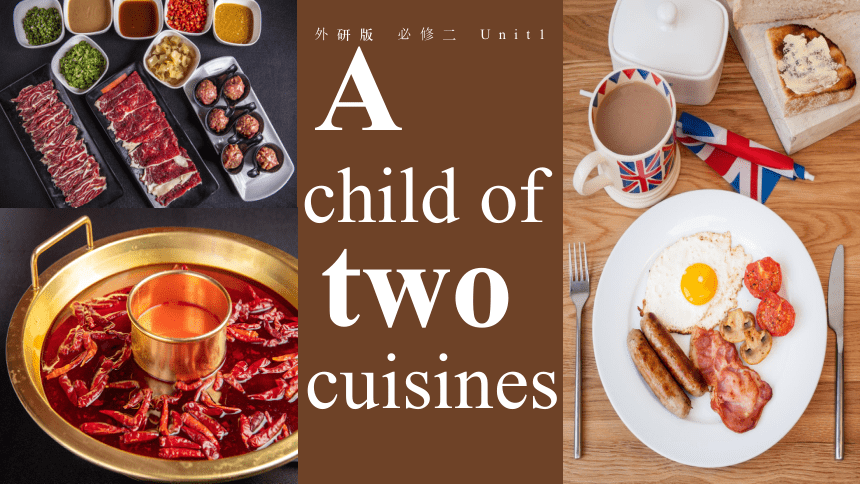 | |
| 格式 | pptx | ||
| 文件大小 | 87.8MB | ||
| 资源类型 | 教案 | ||
| 版本资源 | 外研版(2019) | ||
| 科目 | 英语 | ||
| 更新时间 | 2024-04-18 09:46:04 | ||
图片预览


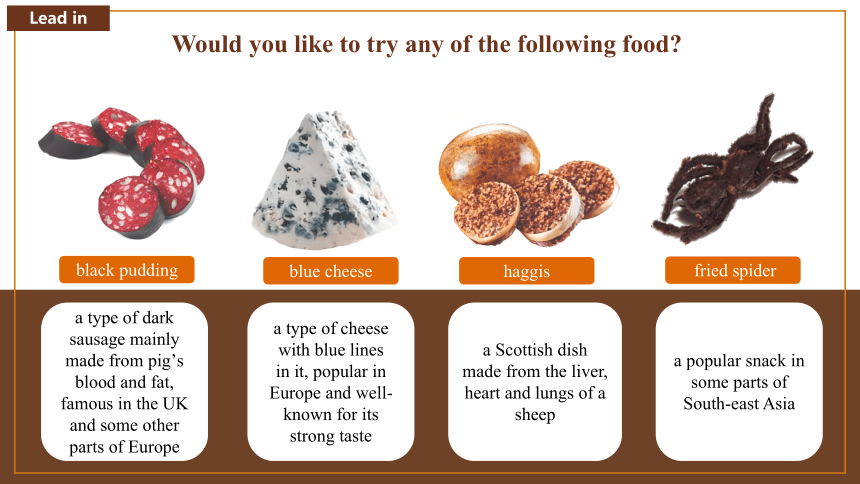
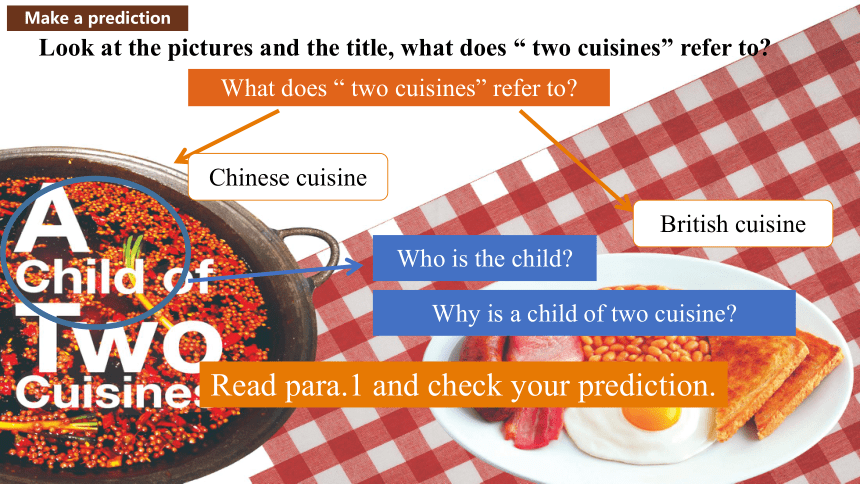
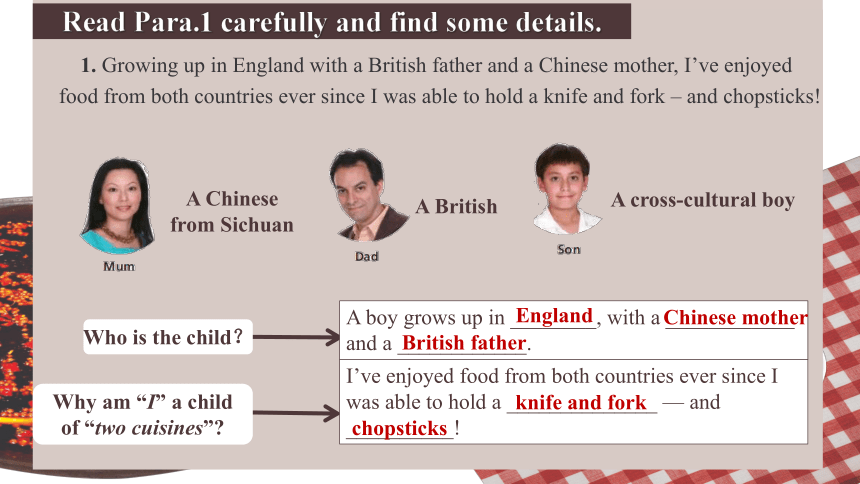
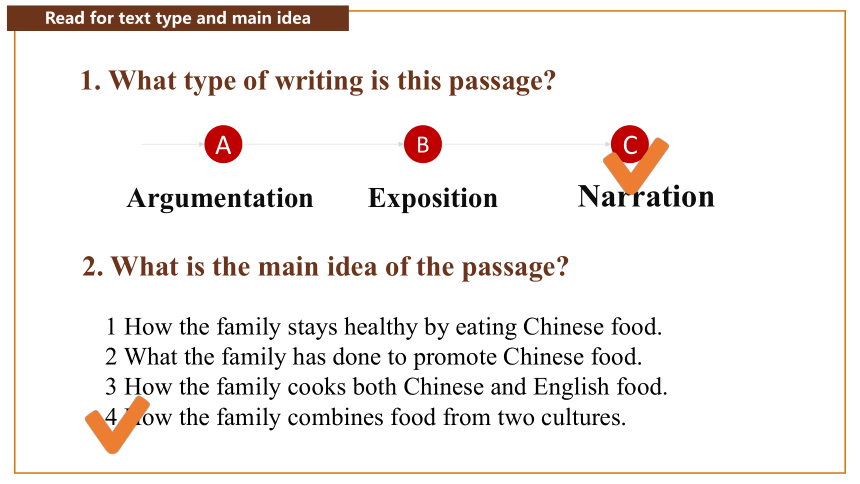
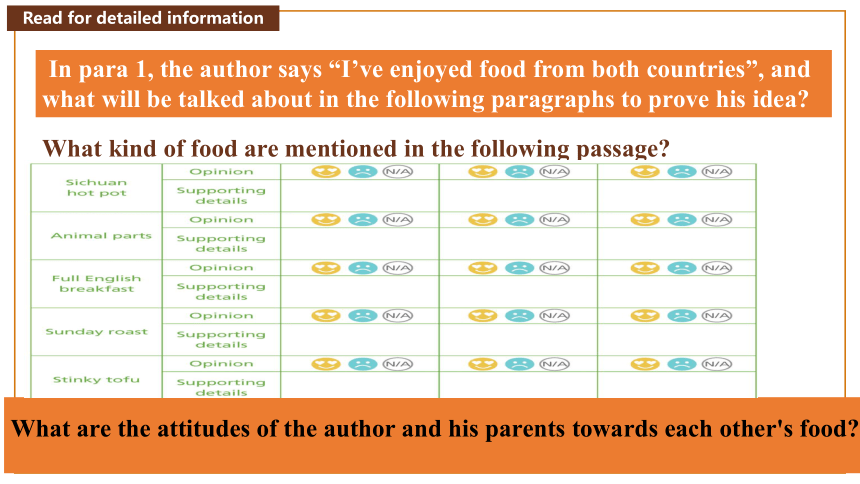
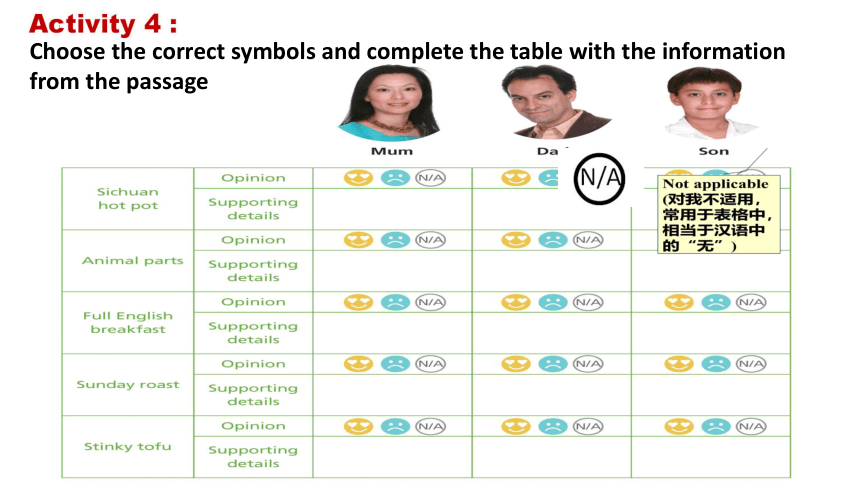
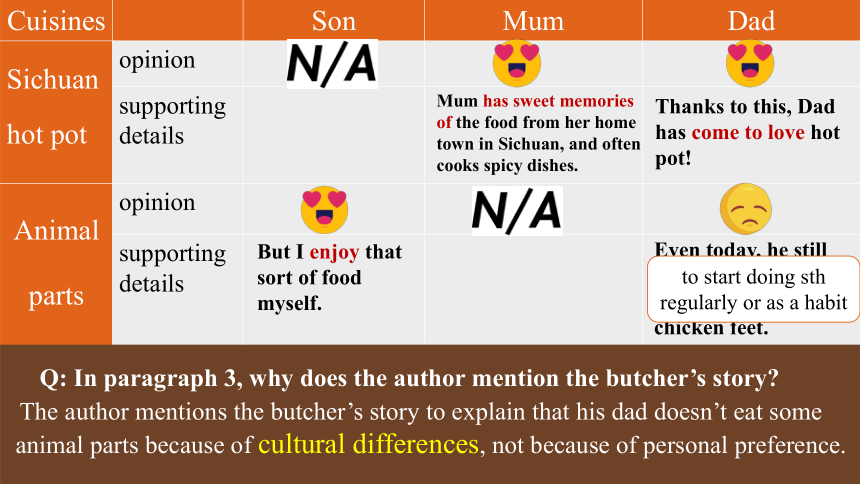
文档简介
(共21张PPT)
外研版 必修二 Unit1
A
child of
two
cuisines
There is an old saying in China,
“Food is the first necessity of the people.”
What food from other countries have you tried
Would you like to try any of the following food
black pudding
blue cheese
haggis
fried spider
a type of dark sausage mainly
made from pig’s blood and fat, famous in the UK and some other parts of Europe
a type of cheese with blue lines
in it, popular in Europe and well-known for its strong taste
a Scottish dish made from the liver,
heart and lungs of a sheep
a popular snack in some parts of
South-east Asia
Lead in
Look at the pictures and the title, what does “ two cuisines” refer to
Make a prediction
What does “ two cuisines” refer to
Chinese cuisine
British cuisine
Who is the child
Read para.1 and check your prediction.
Why is a child of two cuisine
Read Para.1 carefully and find some details.
A Chinese from Sichuan
A British
A cross-cultural boy
1. Growing up in England with a British father and a Chinese mother, I’ve enjoyed
food from both countries ever since I was able to hold a knife and fork – and chopsticks!
Why am “I” a child of “two cuisines”
Who is the child?
A boy grows up in ________, with a ____________ and a ____________.
I’ve enjoyed food from both countries ever since I was able to hold a ______________ — and __________!
England
British father
Chinese mother
knife and fork
chopsticks
Read for text type and main idea
2. What is the main idea of the passage
A
B
C
1. What type of writing is this passage
Argumentation
Exposition
Narration
1 How the family stays healthy by eating Chinese food.
2 What the family has done to promote Chinese food.
3 How the family cooks both Chinese and English food.
4 How the family combines food from two cultures.
Read for detailed information
In para 1, the author says “I’ve enjoyed food from both countries”, and what will be talked about in the following paragraphs to prove his idea
What kind of food are mentioned in the following passage
What are the attitudes of the author and his parents towards each other's food
Activity 4 :
Choose the correct symbols and complete the table with the information from the passage
Cuisines Son Mum Dad
Sichuan hot pot opinion
supporting details
Animal parts opinion
supporting details
Mum has sweet memories of the food from her home town in Sichuan, and often cooks spicy dishes.
Thanks to this, Dad has come to love hot pot!
But I enjoy that sort of food myself.
Even today, he still does not easily take to eating things like chicken feet.
to start doing sth regularly or as a habit
The author mentions the butcher’s story to explain that his dad doesn’t eat some animal parts because of cultural differences, not because of personal preference.
Q: In paragraph 3, why does the author mention the butcher’s story
Cuisines Son Mum Dad
Full English breakfast opinion
supporting details
Sunday roast opinion
supporting details
Stinky tofu opinion
Mum and I just have to find a way to get him into the kitchen!
We all love roast
beef and vegetables.
Mum and I just have to find a way to get him into the kitchen!
We all love roast
beef and vegetables.
We all love roast
beef and vegetables.
Draw a line to show the author’s changing feelings towards stinky tofu.
horrible
came across stinky tofu
gathered all my courage to take a bite
amazed
fall in love with
maybe/someday
Q: What can we learn from the author when we are faced with unacceptable food
We can learn from the author that we should be open-minded to try new cuisines, even if they may look unfamiliar or unappetizing (倒胃口的;看似难吃的).
People in Hunan like to eat Stinky tofu. Stinky tofu is a traditional dish in Hunan cuisine, which has a long history in the local area. Many local residents grew up eating and enjoying it. Its unique aroma and flavor have become a part of local culinary culture (饮食文化).
I came across stinky tofu, a horrible grey thing that looked and smelt like a burnt sports shoe. I gathered all my courage to take a bite and was amazed to find it wasn’t so bad. It reminded me of blue cheese, a similarly strong smelling type of food you either love or hate.
One man’s meat is another
man’s poison.
One man’s meat is another man’s poison.
Something that one person likes may not be liked by someone else.
Read for ideas/values
Q: What is the author's attitude towards the two cuisines
He feels at home with food from both his cultures. That is to say, he feels a sense of belonging and comfort when eating food from both of his cultures.
Q: 1. What causes the differences in cuisines
Q: 2. What attitude should we take towards different culinary cultures
Q: 1. What causes the differences in cuisines
Culture and history: different cultures and historical backgrounds will shape different culinary styles.
Geography and climate: the geography and climate of different regions will also affect the development of cuisine.
Culinary techniques: differences in culinary techniques (steaming, boiling, roasting, frying, etc.) will also lead to differences in cuisine.
Table settings and eating habits: differences in table settings and eating habits will also affect the development of cuisine.
Q: 2. What attitude should we take towards different culinary cultures
We should respect and accept different culinary cultures. Different culinary cultures have their own unique historical, cultural backgrounds, and flavor characteristics, which can help us have a deeper understanding and appreciation of different cultures.
In addition, different culinary cultures can also provide new taste experiences and stimulate creativity in the kitchen. Therefore, we should learn, respect, and appreciate different culinary cultures, rather than ignoring or rejecting them.
DISH DISPLAY
Mercury is the closest planet to the Sun and the smallest one in the Solar System—it’s only a bit larger than our Moon. The planet’s name has nothing to do with the liquid metal,
DISH DISPLAY
Mercury is the closest planet to the Sun and the smallest one in the Solar System—it’s only a bit larger than our Moon. The planet’s name has nothing to do with the liquid metal,
Read for language
What expressions does the author use to describe food and people’s feelings towards food
Food
Feelings(like)
Feelings (dislike)
spicy/super/typical/
stinky/a horrible grey thing looks and smells like a burnt sports shoe/a strong smelling type of food/
cross-cultural
have sweet memories of love/enjoy/come to love/amazed/take to doing/not so bad/fall in love with/feel at home with
dare not try/ surprised/shocked/amazed/do not take to doing/ gather all my courage to take a bite
Watch the video and complete the table.
The words and phrases describing food
Beijing duck
dazhaxie
Sichuan hotpot
Starting out
The words and phrases describing food
Beijing duck crispy on the outside, soft on the inside, delicious, juicy, goes really well with the pancakes and the sweet sauce
dazhaxie since the Han Dynasty, steam it to keep its original flavour, surprisingly good
Sichuan hot pot hot, tasty, a challenge, my mouth is on fire, a burning mouth
Sharing
Your foreign friend Mary is going to visit China next week. Would you please recommend your favorite Chinese dish to her, including the appearance, smell, taste and your feelings
外研版 必修二 Unit1
Thanks!
外研版 必修二 Unit1
A
child of
two
cuisines
There is an old saying in China,
“Food is the first necessity of the people.”
What food from other countries have you tried
Would you like to try any of the following food
black pudding
blue cheese
haggis
fried spider
a type of dark sausage mainly
made from pig’s blood and fat, famous in the UK and some other parts of Europe
a type of cheese with blue lines
in it, popular in Europe and well-known for its strong taste
a Scottish dish made from the liver,
heart and lungs of a sheep
a popular snack in some parts of
South-east Asia
Lead in
Look at the pictures and the title, what does “ two cuisines” refer to
Make a prediction
What does “ two cuisines” refer to
Chinese cuisine
British cuisine
Who is the child
Read para.1 and check your prediction.
Why is a child of two cuisine
Read Para.1 carefully and find some details.
A Chinese from Sichuan
A British
A cross-cultural boy
1. Growing up in England with a British father and a Chinese mother, I’ve enjoyed
food from both countries ever since I was able to hold a knife and fork – and chopsticks!
Why am “I” a child of “two cuisines”
Who is the child?
A boy grows up in ________, with a ____________ and a ____________.
I’ve enjoyed food from both countries ever since I was able to hold a ______________ — and __________!
England
British father
Chinese mother
knife and fork
chopsticks
Read for text type and main idea
2. What is the main idea of the passage
A
B
C
1. What type of writing is this passage
Argumentation
Exposition
Narration
1 How the family stays healthy by eating Chinese food.
2 What the family has done to promote Chinese food.
3 How the family cooks both Chinese and English food.
4 How the family combines food from two cultures.
Read for detailed information
In para 1, the author says “I’ve enjoyed food from both countries”, and what will be talked about in the following paragraphs to prove his idea
What kind of food are mentioned in the following passage
What are the attitudes of the author and his parents towards each other's food
Activity 4 :
Choose the correct symbols and complete the table with the information from the passage
Cuisines Son Mum Dad
Sichuan hot pot opinion
supporting details
Animal parts opinion
supporting details
Mum has sweet memories of the food from her home town in Sichuan, and often cooks spicy dishes.
Thanks to this, Dad has come to love hot pot!
But I enjoy that sort of food myself.
Even today, he still does not easily take to eating things like chicken feet.
to start doing sth regularly or as a habit
The author mentions the butcher’s story to explain that his dad doesn’t eat some animal parts because of cultural differences, not because of personal preference.
Q: In paragraph 3, why does the author mention the butcher’s story
Cuisines Son Mum Dad
Full English breakfast opinion
supporting details
Sunday roast opinion
supporting details
Stinky tofu opinion
Mum and I just have to find a way to get him into the kitchen!
We all love roast
beef and vegetables.
Mum and I just have to find a way to get him into the kitchen!
We all love roast
beef and vegetables.
We all love roast
beef and vegetables.
Draw a line to show the author’s changing feelings towards stinky tofu.
horrible
came across stinky tofu
gathered all my courage to take a bite
amazed
fall in love with
maybe/someday
Q: What can we learn from the author when we are faced with unacceptable food
We can learn from the author that we should be open-minded to try new cuisines, even if they may look unfamiliar or unappetizing (倒胃口的;看似难吃的).
People in Hunan like to eat Stinky tofu. Stinky tofu is a traditional dish in Hunan cuisine, which has a long history in the local area. Many local residents grew up eating and enjoying it. Its unique aroma and flavor have become a part of local culinary culture (饮食文化).
I came across stinky tofu, a horrible grey thing that looked and smelt like a burnt sports shoe. I gathered all my courage to take a bite and was amazed to find it wasn’t so bad. It reminded me of blue cheese, a similarly strong smelling type of food you either love or hate.
One man’s meat is another
man’s poison.
One man’s meat is another man’s poison.
Something that one person likes may not be liked by someone else.
Read for ideas/values
Q: What is the author's attitude towards the two cuisines
He feels at home with food from both his cultures. That is to say, he feels a sense of belonging and comfort when eating food from both of his cultures.
Q: 1. What causes the differences in cuisines
Q: 2. What attitude should we take towards different culinary cultures
Q: 1. What causes the differences in cuisines
Culture and history: different cultures and historical backgrounds will shape different culinary styles.
Geography and climate: the geography and climate of different regions will also affect the development of cuisine.
Culinary techniques: differences in culinary techniques (steaming, boiling, roasting, frying, etc.) will also lead to differences in cuisine.
Table settings and eating habits: differences in table settings and eating habits will also affect the development of cuisine.
Q: 2. What attitude should we take towards different culinary cultures
We should respect and accept different culinary cultures. Different culinary cultures have their own unique historical, cultural backgrounds, and flavor characteristics, which can help us have a deeper understanding and appreciation of different cultures.
In addition, different culinary cultures can also provide new taste experiences and stimulate creativity in the kitchen. Therefore, we should learn, respect, and appreciate different culinary cultures, rather than ignoring or rejecting them.
DISH DISPLAY
Mercury is the closest planet to the Sun and the smallest one in the Solar System—it’s only a bit larger than our Moon. The planet’s name has nothing to do with the liquid metal,
DISH DISPLAY
Mercury is the closest planet to the Sun and the smallest one in the Solar System—it’s only a bit larger than our Moon. The planet’s name has nothing to do with the liquid metal,
Read for language
What expressions does the author use to describe food and people’s feelings towards food
Food
Feelings(like)
Feelings (dislike)
spicy/super/typical/
stinky/a horrible grey thing looks and smells like a burnt sports shoe/a strong smelling type of food/
cross-cultural
have sweet memories of love/enjoy/come to love/amazed/take to doing/not so bad/fall in love with/feel at home with
dare not try/ surprised/shocked/amazed/do not take to doing/ gather all my courage to take a bite
Watch the video and complete the table.
The words and phrases describing food
Beijing duck
dazhaxie
Sichuan hotpot
Starting out
The words and phrases describing food
Beijing duck crispy on the outside, soft on the inside, delicious, juicy, goes really well with the pancakes and the sweet sauce
dazhaxie since the Han Dynasty, steam it to keep its original flavour, surprisingly good
Sichuan hot pot hot, tasty, a challenge, my mouth is on fire, a burning mouth
Sharing
Your foreign friend Mary is going to visit China next week. Would you please recommend your favorite Chinese dish to her, including the appearance, smell, taste and your feelings
外研版 必修二 Unit1
Thanks!
